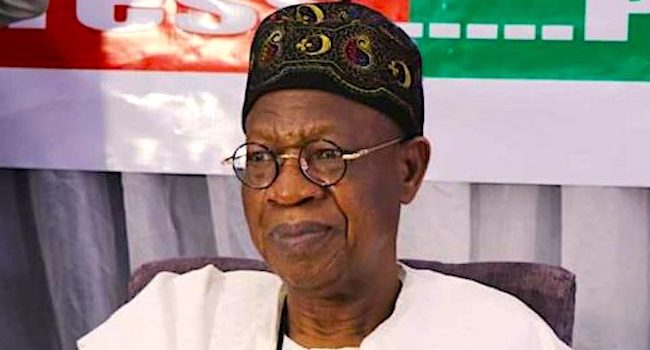Politics
Why Nigerian govt launched campaign against fake news, hate speech —Lai Mohammed

The Minister of Information and Culture, Lai Mohammed has detailed the rationale behind the fight against fake news and hate speech.
Mohammed spoke on Thursday during the Regional Forum for West Africa while speaking on the UNESCO World Report on Freedom of Expression 2021/20221.
According to him, the spread of misinformation and fake news means media houses must set up a fact-checking desk to arrest such prevalence.
He said, “It is instructive to note that the freedom of expression we enjoy comes with a huge responsibility.
“Sadly, some of our compatriots in the journalism profession take advantage of this freedom to engage in misinformation and hate speech and to spread fake news.
“That was why we launched a national campaign against fake news and hate speech in 2018, a campaign that has brought the issue to the front burner of national discourse.
“I want to urge journalists within the West African sub-region to join hands with our various governments to curb the activities of such journalists who taint the image and good works of those of us who desire to uphold the ethos and professionalism of this very important profession.”
Read also: Buhari warns Nigerian media on hate speech, unethical conduct
The Minister further noted that Nigeria has a lively, pluralistic, and free press which would not have been possible without an enabling atmosphere.
He stated that the media will never be considered as a threat under President Muhammadu Buhari’s government, but rather as vital partners in the country’s success.
“The report being presented today will further provide our leaders, media administrators, practitioners, and various stakeholders in the information sector insights into the successes achieved and the multidimensional challenges to freedom of expression and media development within the context of our various legal frameworks.
“It is a well-known fact that freedom of expression is a fundamental human right enshrined in our various statutes and legal mechanisms.
“And it is also a key feature of democracy across the world. Article 19 of the Universal Declaration of Human Rights captures this succinctly.
“Over the years, countries have made efforts to liberalise the media landscape by making it conducive for practitioners by adopting laws in this regard. We have also seen the glaring need to protect journalists and build their capacities to conform to the ever-changing standards of practice, especially with emerging technologies and particularly social media. UNESCO has provided leadership in this regard,” he said.
Join the conversation
Support Ripples Nigeria, hold up solutions journalism
Balanced, fearless journalism driven by data comes at huge financial costs.
As a media platform, we hold leadership accountable and will not trade the right to press freedom and free speech for a piece of cake.
If you like what we do, and are ready to uphold solutions journalism, kindly donate to the Ripples Nigeria cause.
Your support would help to ensure that citizens and institutions continue to have free access to credible and reliable information for societal development.




















